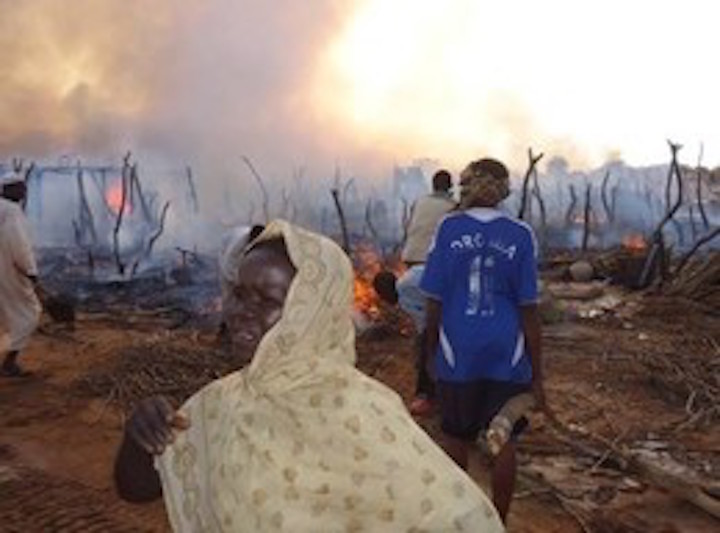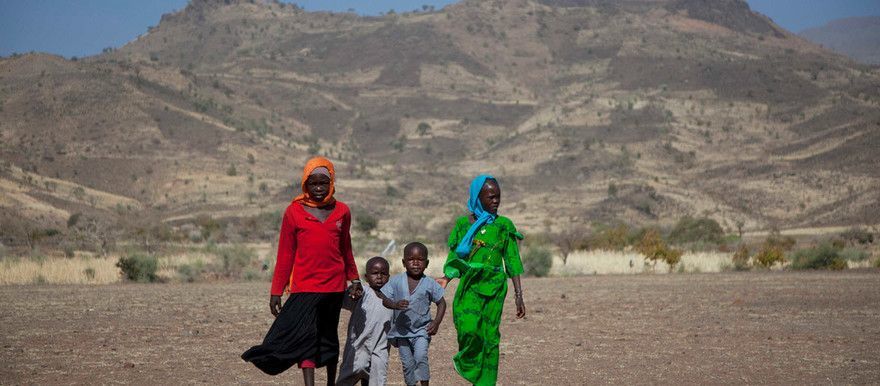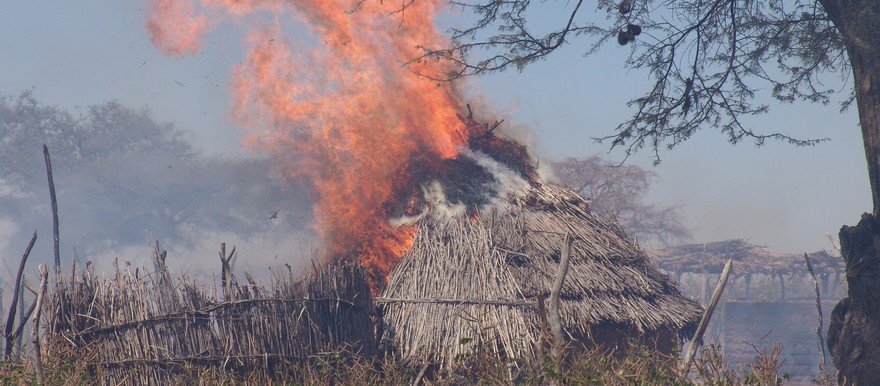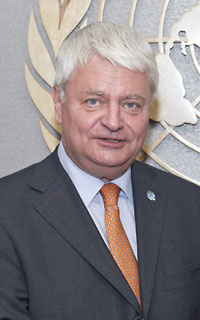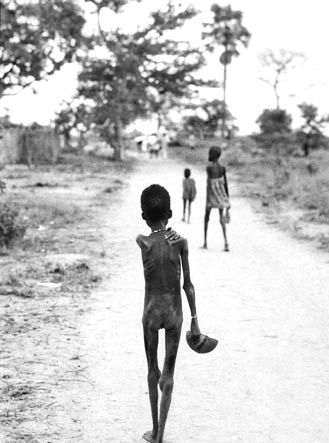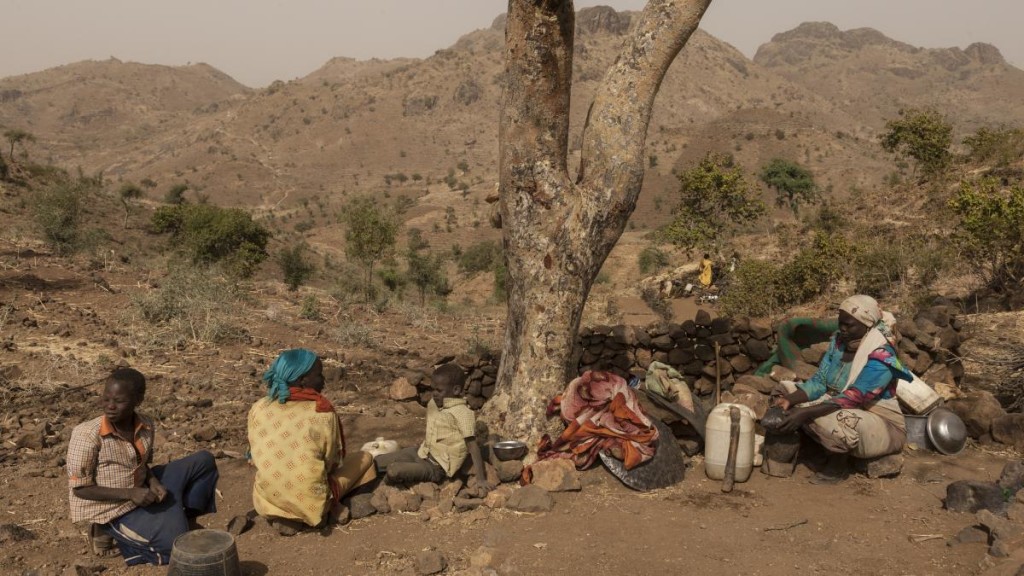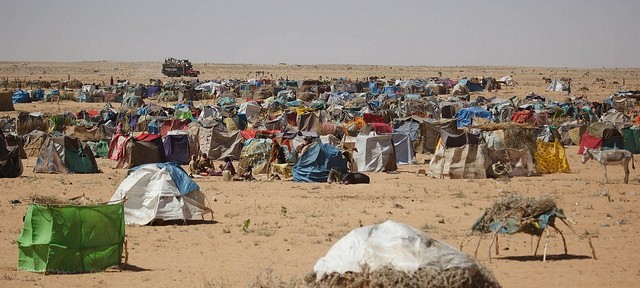Darfur: Radio Dabanga News Digest Number 26 | 11 October 2015 | An ongoing chronicle of human suffering and destruction—and international indifference |
Eric Reeves ~
This twenty-sixth installment of Darfur: Radio Dabanga News Digest focuses on events of the past two weeks, including violence and insecurity in North Darfur and the continuing deterioration in humanitarian conditions throughout Darfur and much of Sudan. The digest again focuses on those stories most illustrative of the grim relief needs affecting millions of Sudanese; these are communities that have suffered most and experienced the greatest harm from the actions of various European and other financial institutions (BNP Paribas most conspicuously). Humanitarian programs, including those of the UN’s World Food Program, are desperately underfunded. Even a large grant recently from the U.S. Agency for International Development (USAID) has brought funding for this year’s critical humanitarian relief efforts to only 50 percent—with 50 percent unfunded with less than three months remaining in the year.
Two dispatches from the European Commission for Humanitarian Aid and Civil Protection are included here because they give some sense of the scale from the perspective of one important humanitarian assessment team:
“Some 6.6 million people are reliant on some form of humanitarian assistance in Sudan.”
“Meanwhile, the conflict in both Blue Nile and South Kordofan states has affected over 1.1 million people, resulting in an increasing number of Sudanese refugees in Ethiopia and South Sudan, as well as nearly 380,000 internally displaced persons. In addition and since conflict broke out in South Sudan, over 190,000 South Sudanese refugees are estimated to have sought refuge in the southern states of Sudan.”
“One in every three children aged under five is stunted and one in six weighs too little for his or her height. Four states, including North Darfur, have acute malnutrition levels.”
These figures complement the shocking findings promulgated by the UN Office for the Coordination of Humanitarian Affairs (OCHA) from this past August: In Sudan 3 million children under age 5 suffer from malnutrition. Data from OCHA also reveal that 2 million children under age five suffer from chronic malnutrition; a further 1 million suffer from acute malnutrition; and of these acutely malnourished children, 550,000 are severely malnourished and at risk of death.
Of particular note is the continuing seizure of lands and livelihoods in Darfur, coupled with the relentless aerial assault on agricultural production. Village destruction in North Darfur remains extremely intense, even as there are increasingly reports of violence from West Darfur and South Darfur. Rape continues to be reported constantly as a weapon of war in Khartoum’s brutal counter-insurgency effort. Altogether this violence has created an extremely food insecure environment, reflected in figures from the UN’s World Food Program, UNICEF, and the Office for the Coordination of Humanitarian Affairs.
Broadest context:
Throughout Darfur and indeed much of Sudan, various humanitarian indicators continue a relentless deterioration. Additionally, the most recent reports from OCHA present a truly terrifying portrait of malnutrition throughout Sudan, but especially in Darfur, where most of the region is indicated as suffering from Global Acute Malnutrition (GAM) rates that are above the emergency humanitarian threshold; large excerpts from the report and commentary may be found here. Huge swathes of eastern Sudan, Blue Nile, and other areas also have GAM rates above the emergency threshold.
Khartoum’s unrelenting campaign of intimidation and humanitarian obstruction proceeds from the weakness of the international community in confronting what are arguably crimes against humanity. International failure to come to terms with the real nature of the Khartoum regime continues to be on painful display. The U.S. and Europe have never seemed more powerless in bringing about the changes necessary if Sudan is to escape the 26 years of brutal tyranny by the National Islamic Front/National Congress Party, and its endless wars on its own people. Khartoum’s imposition of a humanitarian embargo on large parts of South Kordofan and Blue Nile—dating to June 2011—continues without meaningful international objection or pressure on Khartoum to relent this brutal war strategy of killing civilians to weaken rebel forces. The African Union has proved both feckless and corrupt in its dealings with Khartoum.
UNAMID suffered the loss of yet another peacekeeper, even as Khartoum makes increasingly clear its insistence that the Mission withdraw in the near future. Accusations against UNAMID officials, denial of the mass sexual assault on the girls and women of Tabit, North Darfur by SAF troops, and hostile propaganda all signal that pressure to withdraw is rising.
BNP Paribas restitution funds for greater Sudan: These funds (see http://sudancommunitycompensation.org/) will be effective in providing emergency relief aid only if there is greater pressure on Khartoum to grant humanitarian access. As noted above, such money is desperately needed for current programs that are grossly underfunded; but much of what is needed most urgently requires greater access than Khartoum presently provides.
At the same time, the U.S. Department of Justice must release the immense funds earmarked by DOJ for restitution ($3.84 billion, the vast majority for Sudan); this is likely to require a considerable increase in pressure on DOJ from the U.S. Congress. The needs, however, could hardly be more urgent.
The dwindling international humanitarian presence in Darfur
More than thirty international humanitarian organizations have been expelled from Darfur—or compelled to leave because of violence—and increasingly funding shortages. Organizations that remain and are presently at work deserve the most urgent of funding. Norwegian Church Aid is only the most recent:
• “Funding woes force NGO from Garsila, formerly West Darfur“ | October 4, 2015 | Garsila, formerly West Darfur
[Norwegian Church Aid is withdrawing from one of the most desperately need locations in all of Darfur—ER]
[Because the News Digest now appears on a biweekly basis, dispatches will typically be reduced to the title, the URL (always embedded in the title), and perhaps a key sentence—and much diminished commentary will be even briefer.]
[For previous Radio Dabanga Digests, see:
Darfur: Radio Dabanga Digest, Number 1 | http://wp.me/p45rOG-1CD [28 February 2015]
Darfur: Radio Dabanga Digest, Number 2 | http://wp.me/p45rOG-1De
Darfur: Radio Dabanga Digest, Number 3 | http://wp.me/p45rOG-1Dt
Darfur: Radio Dabanga Digest, Number 4 | http://wp.me/p45rOG-1Ei
Darfur: Radio Dabanga Digest, Number 5 | http://wp.me/p45rOG-1EL
Darfur: Radio Dabanga Digest, Number 6 | http://wp.me/p45rOG-1Fp [April 6, 2015]
Darfur: Radio Dabanga Digest, Number 7 | http://wp.me/p45rOG-1FL
Darfur: Radio Dabanga Digest, Number 8 | http://wp.me/s45rOG-6452
Darfur: Radio Dabanga Digest, Number 9 | http://wp.me/p45rOG-1Gi
Darfur: Radio Dabanga Digest, Number 10 | http://wp.me/p45rOG-1Gt
Darfur: Radio Dabanga Digest, Number 11 | http://wp.me/p45rOG-1Hq [May 10, 2015]
Darfur: Radio Dabanga Digest, Number 12 | http://wp.me/p45rOG-1HY
Darfur: Radio Dabanga Digest, Number 13 | http://wp.me/p45rOG-1Ia
Darfur: Radio Dabanga Digest, Number 14 | http://wp.me/p45rOG-1II
Darfur: Radio Dabanga Digest, Number 15 | http://wp.me/p45rOG-1Ji
Darfur: Radio Dabanga Digest, Number 16 | http://wp.me/p45rOG-1JU [June 14, 2015]
Darfur: Radio Dabanga Digest, Number 17 | http://wp.me/p45rOG-1Kp
Darfur: Radio Dabanga Digest, Number 18 | http://wp.me/p45rOG-1L7
Darfur: Radio Dabanga Digest, Number 19 | http://wp.me/p45rOG-1Lm
Darfur: Radio Dabanga Digest, Number 20 | http://wp.me/p45rOG-1LM
Darfur: Radio Dabanga Digest, Number 21 | http://wp.me/p45rOG-1Mv [August 2, 2015]
Darfur: Radio Dabanga Digest, Number 22 | http://wp.me/p45rOG-1MX
Darfur: Radio Dabanga Digest, Number 23 | http://wp.me/p45rOG-1Nr
Darfur: Radio Dabanga Digest, Number 24 | http://wp.me/p45rOG-1NH
Darfur: Radio Dabanga Digest, Number 25 | http://wp.me/p45rOG-1NT
Darfur: Radio Dabanga Digest, Number 26 | http://wp.me/p45rOG-1O6 [October 11, 2015]
Per usual, Sudan Tribune has again been the source of several key reports on Darfur and the growing political crisis in Sudan. All emphases in all quoted material (in bold) have been added; all editorial comments are in italics, in blue, with my initials following; a useful and quite recent administrative map of Darfur appears here.
• EU Humanitarian Aid and Civil Protection | October 5, 2015
Sudan remains a humanitarian and development challenge. The problems are chronic and those addressing them are few, largely due to [Khartoum’s] expulsions of many non-governmental organisations (NGOs) in 2009. Malnutrition rates are beyond emergency levels in many regions and disease outbreaks are common. The number of refugees and internally displaced persons remains high, while access to food for the most vulnerable population is an ongoing concern.
Some 6.6 million people are reliant on some form of humanitarian assistance in Sudan. These include over 2.5 million internally displaced persons. Intensified fighting has displaced 430,000 people in Darfur in 2014 alone.
Meanwhile, the conflict in both Blue Nile and South Kordofan states has affected over 1.1 million people, resulting in an increasing number of Sudanese refugees in Ethiopia and South Sudan, as well as nearly 380,000 internally displaced persons.
The humanitarian needs remain huge and are a priority for the humanitarian community, however the situation remains volatile and international humanitarian organisations face harsh difficulties in accessing some areas and delivering aid.
Lack of access to the population in need is a major obstacle. Most of ECHO’s partners operating in the eastern states of the country were closed down by the authorities, leaving very limited humanitarian coverage and response capacity. Sources: UNOCHA; UNHCR; ECHO
The European Commission’s Humanitarian Aid and Civil Protection department (ECHO) is providing support in several sectors including health and nutrition, water and sanitation, food security and livelihoods, as well as catering for the needs of the conflict-affected people. ECHO mainly focuses on Darfur given the prevailing needs and the access conditions, but also funds interventions in other areas of Sudan. Emergency preparedness and response in the sectors of food assistance and livelihoods, access to health, provision of clean water and sanitation, shelter and non-food items for conflict-affected populations are priority actions for the European Commission.
[One of the clear implications of this latter paragraph in the assessment is that resources are in place to respond to many aspects of the vast humanitarian crisis, even if badly underfunded—ER]
• “Treating malnutrition in Sudan’s North Darfur” | (October 5, 2015), from European Commission Humanitarian Aid Office
Sudan is among the countries in the world with the highest rate of undernutrition. One in every three children aged under five is stunted and one in six weighs too little for his or her height. Four states, including North Darfur, have acute malnutrition levels. The UN World Food Programme (WFP) is responding to the nutritional needs of vulnerable children through a variety of interventions that include a supplementary feeding programme and the treatment of moderate acute malnutrition for all children under five.
From Radio Dabanga: primary reports of violence
• Herders expel farmers in Sirba, West Darfur | October 4, 2015 | Sirba, West Darfur
The farmers living in the area of Abu Suruj in West Darfur’s Sirba locality have complained since Thursday about attacks by militant herders. The police did not intervene, despite an “incentive” paid by the farmers. Speaking to Radio Dabanga, one of the victims said that herders expelled the farmers in the areas of Rijil El Mur and Mordok by force of arms, and released their cattle and camels onto their lands.
[There can be no peace in Darfur unless the land seizures and appropriations by Arab militias (“militant herders”) are reversed and restitution occurs for farmers who have lost everything to destruction of crops and villages—ER]
• Gunmen kill teacher, student in Darfur | October 9, 2015 | Zalingei, Nyala
• Border Guards raid more villages in Kutum, North Darfur | October 9, 2015 | Kutum, North Darfur
An attack by members of the Border Guards on villages near Kutum town, North Darfur, resulted in the wounding of a number of residents on Thursday. Most of the victims were reportedly women. The paramilitaries robbed the people of their money and livestock and torched their villages. Members of the Border Guards arrived in three Land Cruisers mounted with Dushka machine guns and on the backs of camels at the villages Zakaria Mohamed Idris, Adam Yousif, Edelgarad, Bashar Abdelbanad, Ahmed Babur, and Amarjadid at about 10am. A witness reported to Radio Dabanga that they whipped and beat villagers before taking their money and property, and took off with their livestock. The six villages, mostly inhabited by women, were torched. “The villages were completely burned. Many people, mostly women, were wounded. Three children went missing.”
[UNAMID has repeatedly proved it is powerless to halt such brutal, ethnically-targeted attacks on villages, with self-enrichment and expression of racial hatred the motivation—ER]
• Villages raided, emptied in Tawila, North Darfur | September 27, 2015 | Tawila, North Darfur
An as yet unknown number of people were injured, two women were gang-raped, and three people were abducted during attacks on Saturday in villages in North Darfur’s Tawila locality, an area traditionally considered part of East Jebel Marra. Fleeing villagers told Radio Dabanga on Sunday afternoon that groups of militiamen and militant camel herders attacked Kunjara North and Kunjara South, 25 kilometre south of Tawila town, and later in the day, the village of Um Tereiteer. “The attackers robbed the people of their belongings and livestock. We saw them gang-rape two women and kidnapped three people before we fled,” one of the victims said. The villagers added that large tracts of farmland were destroyed. “We lost more than 2,500 feddan (1050 ha) with crops in the area of Dubbo and Mashrou Abu Zeid,” another villager specified.
The aftermath of a recent attack on a village near Kutum in North Darfur
• Displaced farmers abused, robbed in South Darfur | September 28, 2015 | Gireida, South Darfur
A family of three were wounded in an attack on a group of displaced near Gireida, South Darfur, on Sunday evening. Speaking to Radio Dabanga, a farmer reported that gunmen riding on camels and horses attacked a group of displaced people who returned from the Gireida camps to cultivate their land in the area. “The attackers stormed the farms while firing into the air. Most of the people fled,” he said. “They found Zakaria Yahya and his family and stabbed him several times. They beat his wife, Fatima Hamed Mahmoud, so hard that one of her legs was broken. They then attempted to slaughter their little son Mustafa Zakaria, causing serious injuries to his neck with a bayonet.” The witness said that the three wounded are currently being treated at Gireida hospital. “The boy in a very bad condition.”
[Reports of violence from South Darfur and West Darfur have increased in the past two weeks—ER]
• South Darfur farmers flee their land as herders renew attacks | September 30, 2015 | Mershing, South Darfur
Farmers in Mershing locality, South Darfur, complain about continued attacks by militant herders on their farms. More than 300 acres planted with various crops were reportedly destroyed. Many farmers fled their lands. Speaking to Radio Dabanga, an affected farmer reported that “herders armed by the government” repeatedly attacked farmers in the southern part of Mershing the last couple of days. “Since last week more than 300 acres planted with various crops were destroyed,” he said. On Tuesday, a group of herders raided the area of Kola with their livestock. A delegation of farmers filed a complaint at the Mershing police station, to no avail. “There are not many police forces stationed in the locality, and those present did not respond to our complaints, amounting to hundreds,” he explained.
“Furthermore, the herdsmen are freely roaming the area, armed with machine guns and other weapons, and causing fear and panic among the people.” The source said that many farmers have left their farms “for good” as the herders’ assaults persisted.
• Schoolgirl, pregnant woman gang-raped in Kutum, North Darfur | October 8, 2015 | Kutum, North Darfur
• Girl of 14 raped in Turr, South Darfur | September 29, 2015 | Kass, South Darfur
Targets for rape
• Darfuri women, sheikh injured in rape attempts | October 1, 2015 | Kass, South Darfur
• Two girls gang-raped in Bindisi, [formerly West] Darfur | October 5, 2015 | Bindisi, formerly West Darfur
[The epidemic of sexual violence in Darfur shows no signs of abating—see http://sudanreeves.org/2012/03/04/rape-as-a-continuing-weapon-of-war-in-darfur-reports-bibliography-of-studies-a-compendium-of-incidents/—ER]
• School student killed in [formerly West] Darfur’s Aradeiba camp | October 8, 2015 | Garsila, formerly West Darfur
• One dead, three injured in North Darfur attacks | October 7, 2015 | El Fasher / Kabkabiya, North Darfur
• Three shot in West Darfur |September 29, 2015 | El Geneina, West Darfur
• North Darfur’s Nemra village raided, pillaged again | October 4, 2015 | Tawila Locality, North Darfur
A group of militiamen raided Nemra village in North Darfur’s Tawila locality on Saturday. For the second time within two weeks, residents of Nemra had to flee their village in an attack by militiamen. Most of the villagers sought refuge in Tabit, 15 kilometres to the north. “About 65 armed men in two vehicles and on camels stormed the village on Saturday evening,” a villager told Radio Dabanga from Tabit. “They beat the remaining residents, telling them they should have listened to them and left the village weeks ago. They then plundered the basic school and took the only water engine in the area with them,” he reported. “Before leaving, they set fire to around 150 domestic huts. There are now about 30 huts left of the original 600 in the village.”
Tremendous numbers of villages continue to be burned by Arab militias
[By taking the only water engine, Khartoum’s militia forces are ensuring that there will be no return to the village—ER]
• Shops, stalls burn at South Darfur’s Nierteti market | October 1, 2015 | Nierteti, South Darfur
On Tuesday evening, an extensive fire consumed a number of shops and stalls at the old market of Nierteti in South Darfur. The shop owners suspect that army soldiers are behind the fire. On Tuesday afternoon a quarrel broke out at the market between a soldier and a vendor, after which the soldier threatened to torch the market. “At 9 pm, three shops were on fire. Six stalls and five tea and hookah cafeterias burned down too,” a shop owner told Radio Dabanga.
• Kidnapping in North Darfur’s Tawila | October 8, 2015 | Tawila, North Darfur
A young man was kidnapped by militiamen in Tawila locality, North Darfur, on Monday. The gunmen are demanding a ransom for his release. “Yagoub Shumo Saboun (20) was kidnapped in the area of Murtal, 12 kilometres south of Tawila town, on Monday,” Mukhtar Bosh, coordinator of the Tawila camps for the displaced informed Radio Dabanga.
[Because the number of villages in Darfur to be plundered for profit has so dramatically declined, kidnapping for ransom has become widespread as an alternative way of extracting further money and resources from displaced African farmers—ER]
• Driver shot in North Darfur | October 1, 2015 | Kabkabiya, North Darfur
• Villages attacked near El Geneina, West Darfur | October 5, 2015 | El Geneina, West Darfur
Militant herdsmen attacked two villages south of El Geneina, capital of West Darfur, last Thursday as ‘revenge’ for the killing of one of their number. One villager was killed and four others were seriously wounded. The police suspect the four wounded of murdering the herder, and arrested them. The families of the wounded demand that the police immediately transfer them to El Geneina Hospital for treatment, “as they are in dire need of medical treatment and intensive care,” a relative of one of the injured told Radio Dabanga. He explained that a large group of militant herders stormed the villages of Molei and Angounja on Thursday morning in a revenge attack after one of the herders was found killed in the neighbourhood.
[During negotiations over the last renewal of UNAMID’s mandate, West Darfur was mooted as an area from which the Mission would permanently withdraw—this because of its “security.” This was preposterous as a characterization then—and now. That it was under serious consideration, according to a highly informed UN official involved in the talks, suggests just how corrupt the UN Department of Peacekeeping Operations remains under Hervé Ladsous—ER]
Hervé Ladsous, the disastrous head of UN peacekeeping
• Zalingei medics beaten by [formerly West] Darfur police | October 1, 2015 | Zalingei, formerly West Darfur
The medical staff at the hospital of Zalingei, capital of Central Darfur, called an open-ended strike today in protest against police officers beating-up a number of doctors and hospital staff. A medical staff member reported to Radio Dabanga that this morning, police in three vehicles, led by a captain and a lieutenant, arrived at the hospital with a policeman who had been injured in a traffic accident. “After doctors thoroughly examined the injured policeman, they told his superiors that his condition was good enough for him to return home. They did not believe the doctors, however, and insisted that their colleague be admitted to a ward,” he related. “The doctors refused, whereupon the police agents began to beat and kick them. When other hospital workers intervened, they were beaten too. The policemen then took two hospital workers to the police station, where they beat them again, before releasing them.”
• Gunmen kill one in armed attacks, robbery in Darfur | October 2, 2015 | Tawila / Zalingei / Gireida
• Boy shot, passengers robbed in [formerly West] Darfur | October 6, 2015 | Mukjar / Nyala
• Two young herders die as Darfur’s East Jebel Marra shelled | October 7, 2015 | East Jebel Marra
Two boys were killed by a missile launched by government troops stationed in the area of Fanga in East Jebel Marra on Wednesday afternoon. “Government forces fired three rocket-propelled grenades (RPGs) at the area south of Fanga, where a number of young herders were grazing livestock,” a relative of one of the victims told Radio Dabanga. “Aiman Ibrahim Saleh (12) and Yousef Abaker Ahmed (10) were fatally hit, as well as seven cows and five sheep,” he said… “The government forces based in the area of Fanga continuously fire RPGs in all directions.” He appealed to the authorities to “halt the shelling and the use of heavy weapons against defenceless citizens when they are getting water from wells, are grazing their livestock, tending their farms, or visiting a market”.
• Darfur crime overview: Robberies in [formerly West] Darfur | October 5, 2015 | Bindisi / Mukjar / Gireida
[Crimes are so numerous in Darfur that Radio Dabanga has been forced to offer its own compendium of events; notably, West Darfur is again highlighted—ER]
• 12 shot in West Darfur robbery | September 28, 2015 | Murnei, West Darfur
[More violence in West Darfur—ER]
• Darfur crime overview: Robberies, gunfight in South Darfur | September 29, 2015 | Gireida / Nyala / Saraf Umra
Inauspicious signs for the future of UNAMID
UNAMID soldier killed, another wounded in Darfur | September 27, 2015 | Darfur
[Officially, Khartoum is committed to the negotiation of UNAMID’s exit from Darfur; but in fact, it has long been clear, from a wealth of reports—including from the UN itself—that the regime has deliberately engineered a climate of violence directed at UNAMID specifically (more than 200 UNAMID personnel have been killed since the mission officially deployed in January 2008). Although well aware of this fact, international actors—including the UN, the AU, the EU, the U.S. and others refuse to speak openly about this systematic assault on a UN Security Council mandated peacekeeping mission. This sets a terrible precedent; see |
“Killing UN Peacekeepers: A Ruthless Proclivity of Khartoum’s SAF, Militia Proxies” | 9 May 2013 | http://sudanreeves.org/2013/07/15/the-killing-of-seven-unamid-personnel-a-terrible-tragedy-a-clear-warning/
See also:
http://sudanreeves.org/2008/01/14/khartoums-military-forces-deliberately-attack-a-unamid-convoy/
• Sudan insisted on having UNAMID leaving Darfur during UN meetings: FM | Sudan Tribune | October 5, 2015 (KHARTOUM)
The Sudanese foreign minister Ibrahim Ghandour said that his country is committed to ensuring that the hybrid peacekeeping mission in Darfur (UNAMID) leaves the restive region and said that he stressed to UN officials in New York that Khartoum is sticking to the results of the meetings of the Tripartite Commission between with the United Nations (UN) and the African Union (AU). Ghandour speaking to reporters after his return from UN general assembly meetings on Monday said that his government had reached previous understandings on an exit strategy for UNAMID saying it’s a matter of sovereignty.
• AU chair condemns attack on UNAMID in North Darfur | September 30, 2015 | Addis Ababa
• UN Secretary-General condemns attack on UNAMID in North Darfur | September 28, 2015 | New York
These condemnations are constant—as are the calls for prompt and thorough investigation; not one perpetrator of any attack has to date been apprehended by Khartoum’s military or security forces. As to confronting reports of war crimes by its troops and militia forces, Khartoum continues to play a game of contemptuous denial, bordering on ridicule. Thus despite the extraordinary research conducted by Human Rights Watch into the mass sexual assault on Tabit, North Darfur; evidence included interviews with more than fifty witnesses from Tabit: “Sudan: Mass Rape by Army in Darfur: UN, AU Should Press for Protection, International Investigation,” February 11, 2015 | https://www.hrw.org/news/2015/02/11/sudan-mass-rape-army-darfur
UNAMID is now often the target of Khartoum’s propaganda—an ominous sign indeed—ER]
• UNAMID Wicked Scenario | Sudan Vision October 5, 2015
The involvement of some NGOs, UN or UNAMID officials in anti-Sudan activities in favour of certain circles is not shocking or strange. Some countries have been using these organizations to achieve some agenda in the region. Former UNAMID officers have lately disclosed that a senior UNAMID official was behind the fabrication of the mass rape in Tabit area. As a result the Sudanese army was to be victimized and accused of human rights abuse. According to the source, Deputy Chief of UNAMID’s Human Rights Section, Christian Mikala has promoted the fabrication and made contacts with the international body about the incident. These anti-Sudan activities can only be interpreted as wicked act.
[One motive in pushing for the removal of UNAMID from Darfur is the end any possible reporting the Mission might offer in the future; UNAMID’s reporting record to date is miserable, but Khartoum is taking no chances. The effort to complete the transformation of Darfur into a “black box” extends to attempts to halt Darfuris speaking with Radio Dabanga and UNAMID.
• North Darfur camp coordinator told not to report to Radio Dabanga | October 7, 2015 | Saraf Umra
Agents of the National Intelligence and Security Service (NISS) in Saraf Umra locality, North Darfur, have threatened to gag the coordinator of the Saraf Umra camps for the displaced, should he continue to report to Radio Dabanga and UNAMID. Sheikh Abdelrazeg Yousef Suleiman, the coordinator of the Saraf Umra camps, told Radio Dabanga on Tuesday that NISS sergeant Hamadi Abdelshakour handed his family a letter, warning him not to give any information about the security situation and incidents in the locality to Radio Dabanga, UNAMID, or any UN agency.
[One would think UNAMID would afford protection to Sheikh Abdelrazeg Yousef Suleiman. That is extremely unlikely to be the case, at least in any meaningful sense—ER]
• Teacher, vendor detained in South, West Darfur | October 5, 2015 | Gireida / Sirba, West Darfur
[Teachers and the educated generally are favorite targets of the security services—ER]
Humanitarian Indicators:
• “Funding woes force NGO from Garsila, formerly West Darfur“ | October 4, 2015 | Garsila, formerly West Darfur
Last month Norwegian Church Aid (NCA), an NGO working in the field of health, water and livelihoods, reportedly closed its office in Garsila, capital of Wadi Salih locality, Central Darfur. “The organisation closed the office in Garsila on 15 September and transported its five vehicles, five motorcycles, four generators, computers, and other office equipment to its office in the state capital of Zalingei,” a Garsila community elder told Radio Dabanga. The sheikh said that NCA representatives had told them that the Garsila office was closed because of a lack of funds.
• OCHA Sudan: “Acute malnutrition in North Darfur’s Ailliet” | October 11, 2015 | Khartoum
The Global Acute Malnutrition (GAM) rate for North Darfur’s Ailliet locality is 25.3 percent, which is considerably above the emergency threshold of 15 percent. The screening identified 161 children with Severe Acute Malnutrition and 446 children with Moderate Acute Malnutrition.
What does acute, and severely acute malnutrition look like in children? Images from famine in earlier years in South Sudan
[This figure is yet another alarm bell going off: children suffering from Severe Acute Malnutrition are likely to die if not a hospital or emergency feeding facility—ER]
• Hemorrhagic fever kills four in [formerly West] Darfur | October 7, 2015 | Zalingei, formerly West Darfur
• DRA Agriculture Minister predicts food shortage in Darfur | October 7, 2015 | Kass, South Darfur
• Scorpions kill two North Darfur children | October 6, 2015 | El Malha, North Darfur
In June, three children and an adult succumbed to scorpion stings in El Koma locality. In July, two young girls suffered the same fate. “We suffer from a proliferation of scorpions every year during the rainy season,” a listener from the area told Radio Dabanga. People repeated their appeal to the federal and North Darfur Ministries of Health that anti-venom therapy be provided each year.
[The absence of humanitarian medical organizations with anti-venom serum increases the danger of scorpion sting—ER]
• Disease afflicts Kabkabiya children in North Darfur | September 28, 2015 | Kabkabiya, North Darfur
The displaced living in the Kabkabiya camps in North Darfur complain about the outbreak of a hitherto unknown disease among children. “The disease that broke out a month ago affects children up to 18 years old,” the assistant coordinator of North Darfur camps told Radio Dabanga. “The symptoms are high fever, swelling of the body, and ulcers.” The spread of the disease caused panic among the more than 90,000 families living in the camps, “in particular because the medicine given to the patients does not help.”
[The absence of the ability to provide a clear diagnosis is a sign of how poor medical resources are in the area camps—ER]
• Hundreds of homes destroyed by [formerly West] Darfur rains | October 6, 2015 | Deleig, formerly West Darfur
[Natural disasters such as this one require urgent humanitarian response; there is, however, insufficient funding and capacity to take on additional relief work in Darfur—ER]
• “WFP to re-assess newly displaced in North Darfur’s Zamzam“ | October 4, 2015 | Zamzam camp, North Darfur
The newly displaced in Darfur are often far from camps, with few resources
• Patients at [formerly West] Darfur hospital abandoned | October 2, 2015 | Zalingei, formerly West Darfur
The strike of medical staff has left the hospital in Zalingei abandoned, except for a number of unattended patients who lack the money and resources to travel to another hospital. Fearing reprisals by policemen, hospital workers have also abandoned the apartments which are accommodated by the hospital. The staff protest since yesterday against the abuse of their colleagues by policemen inside the hospital in the capital of Central Darfur.
• Darfur displaced must share food in Kalma | October 1, 2015 | Kalma camp, South Darfur
The Darfur Displaced and Refugees Association reported that camp residents are in urgent need of food aid because they have to share their food rations with newly displaced people in Kalma camp, South Darfur. The World Food Programme said that it reaches out with “life-saving food assistance” to these newly displaced. Approximately 41,000 of the displaced people living in Kalma camp in 2013, 2014, and 2015 have not received food ration cards from the humanitarian organisations in the camp, in spite of being registered with the organisations, the spokesman for the Darfur Displaced and Refugees Association reported.
Newly displaced persons, arriving on the outskirts of Kalma camp, South Darfur
[It is difficult to credit the UN World Food program with providing adequate “life-saving assistance” in light of these reports—ER]
• Kalma displaced reject South Darfur housing plans | September 30, 2015 | Kalma camp, South Darfur
• Medicine shortage, disease in North Darfur’s Saraf Umra | September 29, 2015 | Saraf Umra, North Darfur
The displaced in North Darfur’s Saraf Umra locality have renewed their complaints about the deteriorating health situation, marked by the outbreak of a hitherto unidentified disease. Those with health insurance cards are reportedly unable to receive medicines. The coordinator of the Saraf Umra camps, Sheikh Abdelrazeg Yousif Suleiman, said that the disease causes body swelling among the affected camp residents. The camp also witnesses a spread of malaria among a shortage of medicines that makes the prices soar. “The price of malaria medication in the hospital has risen to SDG40 and SDG60 at pharmacies,” Suleiman said ($6.50 and $9.80 respectively). The displaced people in Saraf Umra camps, “who number 37,000,” also struggle to get health insurance cards. In addition, the coordinator demanded from the Ministry of Health to conduct an investigation and find out the reasons why the displaced people who own health insurance cards are unable to receive medicines.
• “Eastern Sudan will become a second Darfur”: former MP | September 30, 2015 | Port Sudan
The states of eastern Sudan are witnessing an increase of armed robberies at highways and in the towns. Armed forces of neighbouring countries increasingly attack places in the region. Hamed Idris, former member of the Legislative Council of the Red Sea state, considers the increase of assaults on citizens in the region “the beginning of the transformation of eastern Sudan into another Darfur.” In an interview with Radio Dabanga, Idris accused the government of being weak and unable to establish the rule of law in the country. “The Sudanese government only focuses on securing Khartoum and ignores the rest of Sudan.”
“The repercussions of this political behaviour on eastern Sudan are disastrous,” he said, and warned for further worsening of the situation if nothing is done. The former state MP complained that the armed robbers, when caught, are sentenced to “lenient penalties” and released again. He also referred to “recent attacks carried out by security forces from neighbouring countries on Halayeb, Fashaga, and the southern part of Red Sea state. “Eastern Sudan has become a centre of human trafficking and arms trade,” he said.
• Activists ‘tortured’ in eastern Sudan | October 9, 2015 | El Faw
• Farm machine theft in eastern Sudan | September 30, 2015 | El Gedaref
Political Developments
• Youth leader, student arrested in [formerly West] Darfur | September 29, 2015 | Nierteti / Gireida
• Travel ban for Sudanese opposition leaders | October 5, 2015 | Khartoum
• Sudan condemns EU diplomats’ visit to protest victims’ families | September 28, 2015 | Khartoum
• Sudan’s opposition parties shun National Dialogue | October 8, 2015 | Khartoum
• “Sese’s inquiry into Darfur Authority staff [is] political” | October 8, 2015 | Khartoum
• “Victims’ health costs run into hundreds of thousands”: September protest committee | October 2, 2015 | Khartoum
The Committee of Solidarity with the victims of the September 2013 demonstrations in Khartoum said that the costs of the treatment of wounded demonstrators have exceeded $400,000. According to the committee’s latest inventory of the aftermath of the bloody street protests against the lifting of fuel subsidies in the Sudanese capital, more than SDG250,000 ($406,100) had to be paid for the treatments of the injured. 45 people have received treatment for a longer period of time. The amount was collected from Sudanese citizens, chairman Siddig Yousif told Radio Dabanga.
• SCP: “Pre-meeting attempts to save Sudan dialogue” | October 2, 2015 | Khartoum
• Sudanese official accused of embezzlement in North Darfur | September 30, 2015 | Kutum, North Darfur
